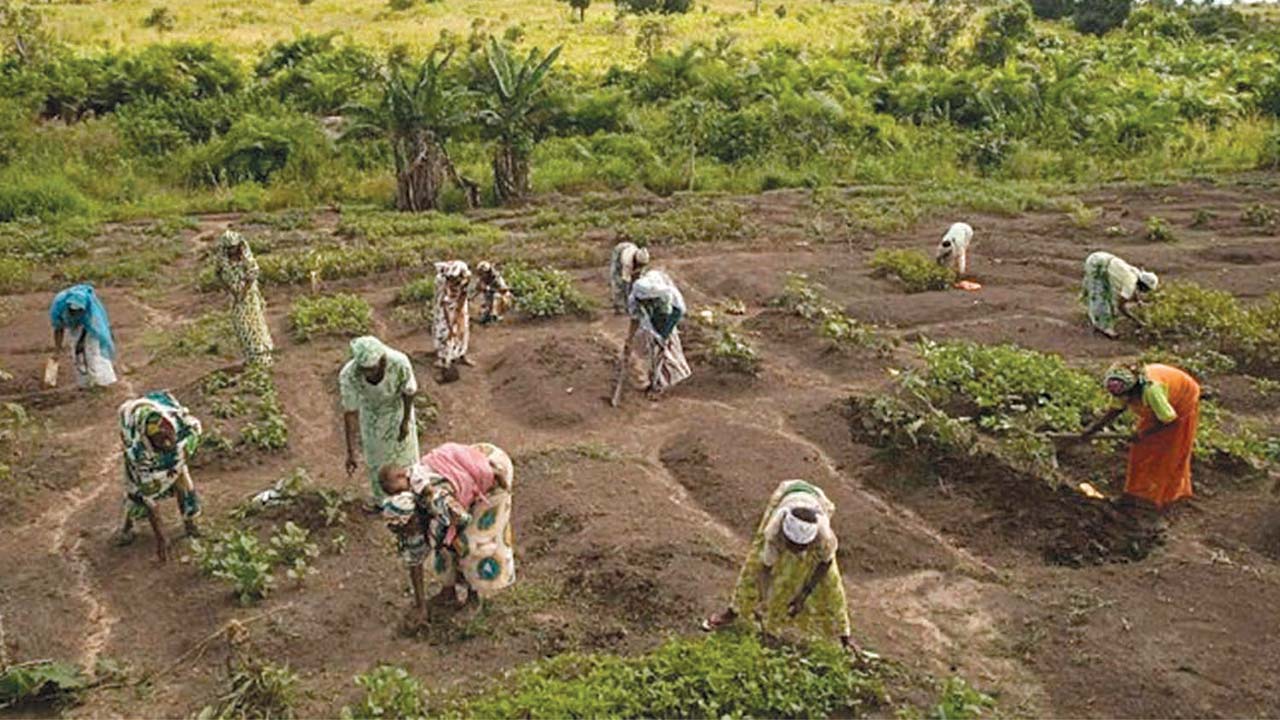
Women farmers
NIGERIA NEWS – The United Nations Food and Agriculture Organization estimates that about 805 million people of the 7.3 billion people in the world, representing ratio one in nine, suffered from chronic undernourishment in 2012-2014. Almost all the hungry people, 791 million, live in developing countries, representing 13.5 percent, or one in eight, of the population of developing counties.
Aside hunger and malnutrition, food insecurity equally results in a wide range of other problems such as health, environmental degradation, and high rate of crime, among others. Conversely, to the extent that food security improves, most facets of life improve as well. With most of its people engaged in activities outside the agricultural sector, the country is in danger of being engulfed in food crisis. To improve agriculture and food security (being able to produce enough food to sustain families and communities year after year), is a herculean task for most African nations. Hence, their people easily become victims of food related problems.
The reasons for this lingering food crisis range from industrialization to crave for higher standard of living and mass rural- urban migration. Other key causative factors are non- availability of urban machinery and credit facilities for farmers as well as lack of empowerment for women farmers.
The springing up of more industries to cater for the growing population of white- collar job seekers affects provision of food for the people. The lands hitherto used for agriculture are being sold to give way for these industries. And often, these lands contain trees- usually felled- needed to boost the oxygenation of the environment as well as production of both food and cash crops.
Commonly tagged dirty and not a money spinning occupation, most young people abhors farming. This is because it does not bring immediate financial returns compare to other jobs such as banking and working in oil servicing firms. There is mass migration of young school leavers from the rural communities to the cities, leaving behind old and tired hands to engage in farming. And in most cases, lower farm yields result which in turn affects supply of food.
Environmental degradation in form of soil erosion and overgrazing, climate change which has caused shifting weather patterns is increasingly viewed as a current and future cause of hunger and poverty because it leads to increasing drought, flooding, and changing climatic patterns requiring a shift in crops and farming practices that may not be easily accomplished.
Erosion is one of the major factors affecting food security, mostly in the South Eastern part of the country. Sometimes ago, the Senate Committee on the environment visited Edo State where the effect of erosion has had a devastating effect on the environment as well as the practice of agriculture.
Another major obstacle to sustaining food security in the country is the communication gap between farmers and policy implementers. In most cases, the policy implementers do not really carry the farmers along in the process of policy implementation. This, perhaps, is responsible for the inability of subsidized fertilizers and loans from the government and its agencies to get to the real farmers who are in dire need of it.
But by far the most important reason for food insecurity is the lack of incentives to women to engage in commercial agriculture.Women play a significant role in agriculture, the world over. About 70% of the agricultural workers, 80% of food producers, and 10% of those who process basic foodstuffs are women and they also undertake 60 to 90% of the rural marketing; thus making up more than two-third of the workforce in agricultural production .
In West Africa, up to 80% of the labour force in all trade is female. Yet, the role of women in these activities, so important economically, has remained obscure for long because women seldom played any major roles in political activities or decision making processes.
Women farmers face a lot of challenges, these include and not limited to lack of access to land and funding, limited access to new practices and technological advancements in farming, less market opportunities among others. In many regions of Africa, women have limited access to land compared to their male counterparts and therefore cannot practice large scale agriculture.
Furthermore, women tend to face greater challenges when it comes to securing credit. They are generally less experienced with the ins and outs of borrowing from an institution, and without assistance and support they find it difficult to access much needed funding. To practice large scale farming, there is need for access to modern technological advancements. The women folk do not have access to these as companies marketing these farm implements often target those that engage in large scale farming- who are often men- to sell these new innovations to.
In addition, lack of market research and information limit women farmers to market opportunities. Women are confined to local markets where prices are generally lower than in urban markets. Furthermore, women farmers are in need of transport and logistics. Lack of access to transport and logistics affect their ability to sell more of their farm produce in time.
As daunting as these challenges are and to stem the tide of food insecurity in Nigeria, the government has to evolve several programmes to facilitate steady food supply through empowering and investing in women, specifically in rural areas. This will significantly increase productivity while reducing hunger and malnutrition. Through the provision of land, seedlings and fertilizers by government at all levels, productivities of women farmers would be enhanced.
In the same vein, financial institutions should make loan facilities available and accessible to female farmers by relaxing the criteria that have to be met before accessing loans. The aforementioned will rub off on their being recognized by modern farm implements producers and marketers, which will invariably lead to higher yields. Also, access to funds will enable the women farmers to be able to procure vehicles which will assist in logistics and prompt delivery of farm outputs to various markets both in the rural and the urban areas.
In all, to ensure food security in the country, government at all levels as well as corporate and financial establishments, commit large chunk of resources towards motivating women farmers. This is necessary for the promotion and advancement of this crucial sector of the economy.
Bakare is of the Features Unit, Ministry of Information & Strategy, Alausa, Ikeja.
Source: TaggedWoman









